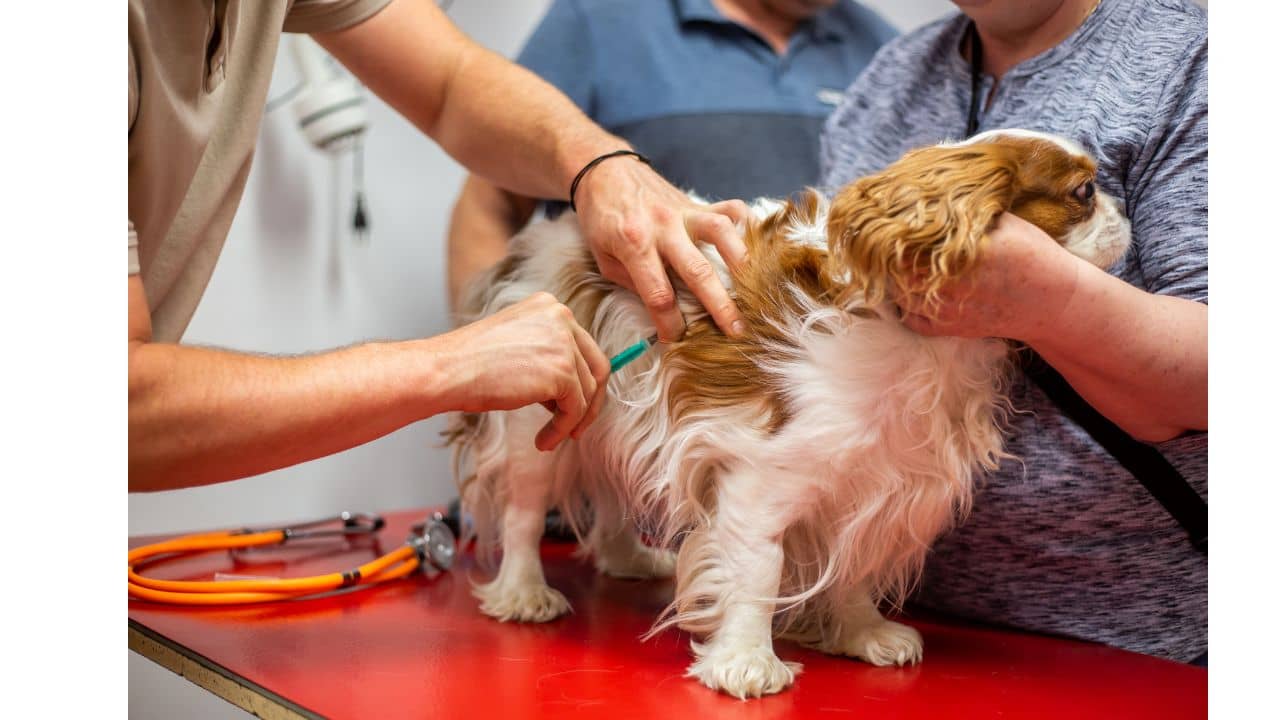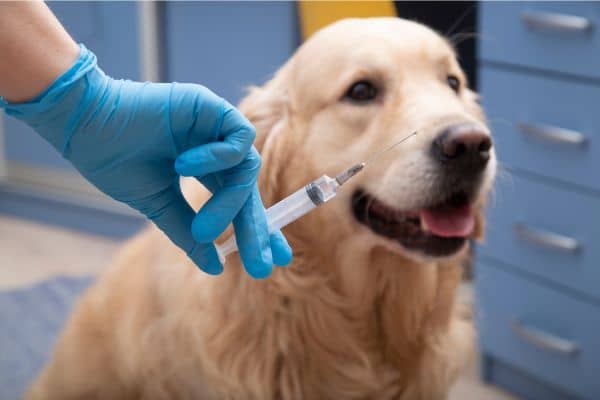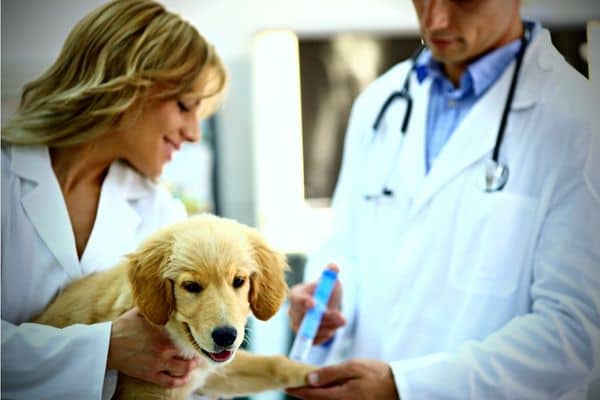Puppy Shot Schedule
Congratulations on your new puppy!
You’re probably eager to get them out and about, meeting other furry friends.
But before you do that, you need to make sure they are vaccinated.
Vaccinations help protect against a variety of illnesses and diseases, so it’s important to keep up with their vaccination schedule.

In this article, we will be discussing the recommended first year puppy shot schedule so you can ensure your pup is healthy and safe!
Overview of Vaccinations
Protecting your furry friend is one of the most important things you can do, and vaccinations are a crucial part of that!
Vaccines provide preventative care for your puppy, helping to keep them healthy and safe from any illnesses or diseases.
Puppy proofing is also an essential part of keeping your pup protected – making sure they have enough toys and stimulation, as well as adequate food and water.
Vaccination schedules for puppies are determined by their age. Generally speaking, a puppy will receive their first set of vaccines at around 8 weeks old.

The typical round of vaccines includes distemper, parvovirus, adenovirus type 2 (hepatitis), parainfluenza virus, leptospirosis, coronavirus, rabies (if legally required in the area), bordetella bronchiseptica (kennel cough) and Lyme disease. Your veterinarian may also recommend additional vaccines based on lifestyle factors such as travel or exposure to other animals.
It’s important to get regular booster shots for your pup – these help ensure their immunity remains strong against any potential threats throughout their life.
Talk with your veterinarian about the best vaccination schedule for your puppy so they stay healthy and happy!
First Year Vaccination Schedule
To keep your pup safe and healthy, regular vaccinations are essential – in fact, about 70% of all vet visits include a vaccination! Vaccinating your puppy during the first year of its life is especially important.
The vaccine costs can vary depending on the type of vaccine and its age; however, puppies typically need several core vaccines that protect against serious diseases like parvovirus, distemper, hepatitis, and rabies.
The American Animal Hospital Association (AAHA) recommends puppies get their first round of shots when they’re six to eight weeks old. This includes the initial booster shot for distemper-parvo combination vaccines. Depending on local laws or veterinarian recommendations, some puppies may also receive their first rabies shot at this time as well.

Puppies should then receive two additional rounds of distemper-parvo combination vaccines three to four weeks apart from each other after their initial set of shots. They should also get boosters at one year old for both distemper and parvovirus as well as any other necessary vaccinations based on lifestyle or risk factors determined by a veterinarian.
At every stage, it’s important to closely monitor your puppy’s health while adhering to proper dosing schedules and maintaining accurate records for future reference.
By following these guidelines, you’ll help ensure your pup has a long and happy life with you as part of the family!
See more for Puppy Shot Schedule: Boost Your Pup’s Health and Happiness
Booster Shots
Staying up to date on booster shots is key to keeping your pet healthy and happy – it’s an important part of their overall health care plan.
Booster shots are a series of vaccinations given throughout your pup’s first year of life, and every one to three years thereafter. These vaccines help protect against serious illnesses caused by viruses or bacteria that can be transmitted through contact with other animals or the environment.
Boosters also help keep your pup healthy when taking part in activities like socializing with other puppies or going outdoors for walks and playtime.
Not all puppies require the same vaccination schedule, so it’s important to consult with your veterinarian about what’s right for your pup.
The most common set of boosters includes distemper, hepatitis, parainfluenza, parvovirus, bordetella (kennel cough), and rabies at 6-8 weeks old; then again at 10-12 weeks old; then usually at 14-16 weeks old; finally after that at 1 year old.
Depending on where you live or any particular risks associated with certain activities you participate in as a family, additional vaccines may be recommended for your pet such as leptospirosis or Lyme Disease.
It’s essential to keep track of when each vaccine is due so you can ensure they stay up to date and properly protected from preventable diseases.
Ask your vet about setting up reminders for upcoming appointments so you can make sure not to miss any boosters!
Importance of Vaccinating Your Puppy
Ensuring your pup is up-to-date on their vaccinations is critical to safeguarding them against potentially serious illnesses. Beyond the preventative care aspect, there are significant socialization benefits that come with vaccinating your puppy.
Not only are you helping to protect them from diseases, but also aiding in their development as a happy and healthy young dog. Vaccines have been developed over time for numerous canine illnesses; from parvovirus and distemper to common kennel cough and rabies.
Depending on where you live, certain vaccinations may be required by law for a pet dog; it’s important to check with your veterinarian or local government office in order to stay informed about what vaccines are necessary for your puppy.
In addition, regular booster shots will help keep your pup’s immune system strong against these diseases over the lifespan of their life. Vaccinations can give puppies an extra layer of protection as they grow into adulthood, allowing them more freedom when it comes to interacting with other animals or exploring new places – something all pups deserve!
Vaccination Risks and Side Effects
Taking the necessary precautions to protect your pup from illnesses is essential, but it’s important to remember that vaccinations come with risks and potential side effects too.
As a pet owner, you must weigh the benefits of vaccinating your puppy against any possible risks associated with vaccines and make an informed decision about which vaccine choice best fits the needs of your pet.
Although rare, some puppies may experience adverse reactions after vaccination. These reactions can range from mild (such as a low-grade fever or temporary discomfort at the injection site) to more serious (such as an allergic reaction or even death in extremely rare cases).
It’s important for pet owners to discuss these possibilities with their veterinarian so they are prepared for any potential outcomes.
The benefits of vaccinating your puppy far outweigh the risks, so long as you take the time to research each vaccine and consult with your veterinarian before making any decisions.
Vaccines help protect your pup from dangerous illnesses that could threaten his health and quality of life—so don’t hesitate to ask questions and ensure that you are comfortable with every step in this process.
Frequently Asked Questions
What age should I vaccinate my puppy?
You should vaccinate your puppy as soon as possible. Vaccinating your puppy not only protects them from dangerous diseases, but also helps them get used to socializing with other animals and people.
To ensure that your pup is safe and healthy, it’s important to start their vaccinations early in life. In addition to getting vaccinations, you must also ‘puppy proof’ your home so that they don’t ingest any harmful substances or get into any dangerous situations.
With the right preparation, you can make sure that your puppy has a happy and healthy first year of life.
What type of vaccinations should my puppy receive?
As a puppy parent, you want to make sure that your furry friend is kept safe and healthy. Vaccinating your puppy is an important part of their well-being, regardless of their breed or size.
Depending on where you live, there are different vaccine types that puppies will need throughout their first year. Generally speaking, most puppies should receive vaccines for distemper, parvovirus, bordetella (kennel cough), rabies, and leptospirosis. Other vaccinations may be recommended depending on the particular breed or risk factors in your area.
Taking care to ensure your pup receives all necessary vaccinations will keep them happy and healthy for years to come!
How often do I need to get booster shots for my puppy?
You want to ensure your puppy is healthy and safe, so it’s important to understand the importance of preventive care and risk assessment. When it comes to booster shots, it’s important to consult with your veterinarian for advice on how often they should be administered.
Depending on the breed, age, health history, and lifestyle of your pup, you may need to get regular booster shots throughout their life. With proper preventive care from a trusted vet, you can feel confident that your four-legged friend will remain happy and healthy for years to come.
Is there a cost associated with vaccinating my puppy?
Vaccinating your puppy is an important and necessary step in keeping them healthy, but it does come with a cost associated.
Vaccines for puppies are generally very cost effective and are typically priced around $20-30 depending on the type and quantity needed.
Vaccines can also vary in price based on location and whether or not they include additional tests such as heartworm testing or titers. However, the most important thing to consider when thinking about cost is vaccine safety; make sure that you only work with reputable veterinarians who use high quality products that will keep your puppy safe from any preventable diseases.
Are there any long-term side effects associated with vaccinating my puppy?
You’ve heard about the importance of vaccinating your puppy, but you may be wondering what long-term side effects there are.
Vaccines have been a trusted tool in protecting animal health for many years, and they’re considered to be very safe. However, it’s important to understand that like any medical procedure, there’s always a risk of side effects.
Generally speaking, these can range from mild reactions like soreness at the injection site to more serious impacts on the immune system. But rest assured that careful monitoring by veterinarians helps ensure vaccine safety for puppies and other animals.
Conclusion
Vaccinating your puppy is crucial to keeping them healthy and happy. Vaccines protect from many debilitating and deadly diseases, so it’s important to stay up-to-date with the schedule.
The risks associated with vaccinations are minimal compared to the benefits they provide. Don’t let fear prevent you from protecting your pup. They may be uncomfortable for a few days after receiving shots, but that’s nothing compared to the pain and suffering caused by an infectious disease.
By following this vaccination schedule, you’ll give your pup the best chance at living a long and healthy life.
